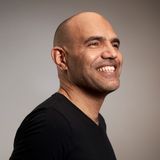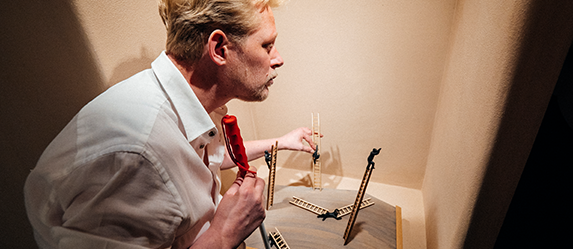In part 1 and 2 of this series, we have seen how designers contribute to (social) change. Focusing on involving users in the actual design process and understanding and meeting the needs and wants of people is crucial. In order to arrive at systems and living environments that everyone – regardless of age, cultural background, ethnicity, capacities, religion, and gender – can relate to in a fair and equal manner, it is desirable to gain more awareness, knowledge, and expertise with inclusive design of public spaces, products, and processes.





OluTimehin Adegbeye (Lagos) is a writer, speaker, and advocate whose work exists at the intersection of social justice, human rights, and inclusion. She is known for her insightful analyses of issues related to gender equality and justice, inclusive urbanisation, feminism and the rights of women and LGBTQ+ people, and literature. As Othering correspondent, she wrote for The Correspondent about what divides us, in order to discover what unites us. In her TED talk on urban inclusion Who Belongs in a City? (2017), she holds our governments and ourselves accountable for keeping our cities safe for everyone. What does it entail to design for all?
The only cities worth building, indeed the only futures worth dreaming of, are those that include all of us, no matter who we are or how we make homes for ourselves.
Simon Dogger (Eindhoven) is a designer with the mission to stimulate social change in society who questions the level of inclusion in society and researches the cause of non-inclusive structures in organizations and culture. Becoming blind in 2009 and graduating from the Design Academy in 2017 with his project The Emotion Whisperer, as a user expert he is able to lay connection to the target groups, understand their desires, and create suitable solutions for a specific assignment. Together with comic artist and product designer Boey Wang he recently started Haptic Aesthetics, a research project to explore a new design methodology that is able to expose the limitations of the contemporary design field and redefines the perception of aesthetics – that shifts the design field from being exclusive to inclusive.

Feelscape © Simon Dogger
As the director of the Post-Academic institute Jan van Eyck Academie in Maastricht, Hicham Khalidi (Maastricht) fosters the work of designers, architects, curators, and artists of all disciplines. The academy commits itself to exploring the role and significance of the arts in relation to the climate crisis and its interlinked socio-political and techno-economic effects. Recently, Khalidi together with Rolando Vàzquez took the initiative to object against naming an ambitious project of the European Commission – aimed at funding innovative scientific and artistic endeavors to abate climate change – after the Bauhaus: ‘Naming this historical project the New European Bauhaus is not only non-inclusive and Eurocentric, it goes against the very core of what climate thinking should be about. An initiative that seeks to foster open and just societies must be committed to intersectional equality along the axes of gender, race, and class.’
Shay Raviv (TelAviv/Netherlands) is a social designer, design researcher and project developer. Raviv works on different projects in which culture, design, and creativity are seen as a means to bridge societal gaps. As a design researcher, she brings stories from different perspectives to the center of a creation process and helps organizations to better understand the people and places they work with. Together with Pim van der Mijl, Raviv co-founded ‘De Voorkamer’ in Utrecht in 2016, a place where cultures meet. At ‘De Voorkamer’, design processes, creativity and culture are incorporated to create safe and inclusive spaces, hereby creating a common ground to connect people from different backgrounds. Next to her own design research practice, Raviv tutors at the Hoge School voor de Kunsten Utrecht (HKU) and Design Academy Eindhoven (DAE).
For DCFA Fellow Lyongo Juliana (Amsterdam), architecture is not just about making locations more beautiful and in balance, it is about creating a people’s experience. In recent years, he has investigated the degree of diversity and inclusiveness of architecture in Amsterdam. In the coming months, Lyongo will continue his research in Pakhuis de Zwijger’s two-year programme.

Issuu - In 2021, Pakhuis de Zwijger's extensive activity programme will commence with the support of the Creative Industries Fund NL. In the context of the super-diverse city, how can designers contribute to the creation of inclusive cities for, and by everyone? Not only in a spatial sense but also with regard to the digital domain and relating to the design of our public systems, services, and products. >>

Feb 15 - Design is everywhere, and everything is designed. Thus, the job title of ‘designer’ encompasses hundreds of industries, job titles, and career paths. What is design and what does it comprehend? In what way does design influence our daily life? How do we design and what skills are needed? And what does it take to be the actual person doing the design? >>

The Correspondent - In writing about the big picture of Othering, OluTimehin Adegbeye's aim has been to deepen our collective awareness that all exclusion is by design – and can therefore be interrupted. >>

Jan van Eyk - The European Commission launched an initiative to fund innovative scientific and artistic endeavors to abate climate change. Drawing on the heritage and language of modernism, this initiative has been coined the new European Bauhaus. While we support the EU Commission’s undertaking we find it unfortunate and misinformed to name it after the Bauhaus School. >>

Harvard University - Hicham Khalidi talks about the challenges of curating in public spaces: 'Public space is not only a sort of free space for citizens to inhabit; it also has to do with rules, laws, city development, and ideas and hunches and aspirations.'






